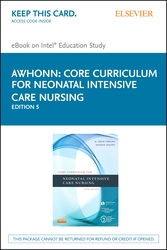Book Description
Perfect as a resource in the field or for exam preparation, this authoritative reference from the Association of Women’s Health, Obstetric, and Neonatal Nurses (AWHONN) includes in-depth coverage of the most common neonatal disorders and their management. The concise outline format highlights the essentials of each condition including definition, etiology, pathophysiology, signs and symptoms, diagnostic tests, treatments, and outcomes to help you find important information quickly. This new edition also features an increased focus on evidence-based practice, new CAMTS and AAMS guidelines, new techniques for PICC placement, and changes to the Neonatal Resuscitation Program.
- All necessary information to prepare for the neonatal intensive care nursing certification examination is included.
- Concise outline format provides access to important nursing considerations associated with the management of the most common conditions in the neonate.
- Text provides a collaborative effort between the three most authoritative associations in neonatal intensive care nursing - AWHONN, AACN, and NANN.
- Information on families, ethics, legal issues, research, case management, and the transition to home acknowledge the full scope of neonatal nursing practice.
- NEW! CAMTS and AAMS guidelines, techniques for PICC placement, and changes to the Neonatal Resuscitation Program are just a few of the updates that reveal the importance the new edition places on safety practices and procedures.
- NEW! Updated chapter on Patient Safety includes selected improvement strategies and resources for neonatal nurses to build a patient safety toolkit, discusses TeamSTEPPS (Team Strategies and Tools to Enhance Performance and Patient Safety), and recognizes human issues, such as shift work and fatigue.
- NEW! Increased focus on evidence-based practice for preterm infants, medications, and antepartum-intrapartum complications sets the standard for neonatal nursing practice.
- NEW! Strategies to promote inclusionary care better reflect nursing care today by focusing on family-centered care, comprehensive perinatal records, health care teams in the NICU, and best practices in the care of the late preterm infant.
- NEW! Comprehensively revised chapter on Immunology identifies risk factors for infection associated with term and preterm infants, distinguishes clinical symptoms and therapies associated with TORCHES CLAP spectrum infections, and includes prevention strategies for hospital-acquired infections.
- NEW! Thoroughly updated content and references reflect currency and technologic advances.
- NEW! Refocused chapter on Developmental Care guides the nurse to use assessment within the context of the environment and situation to initiate interventions in the moment or use patterns of responses for developing plans of care and presents core measures on evaluating developmental care practices in the NICU.


 (0 rating)
(0 rating) 





